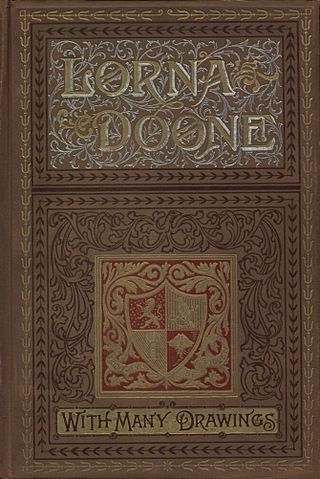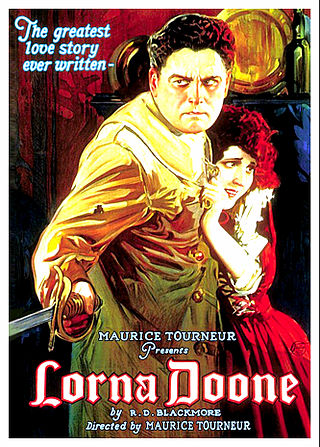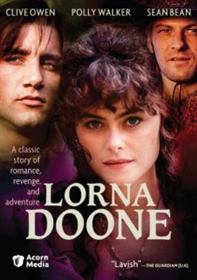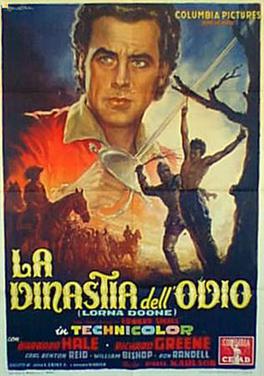
Lorna Doone: A Romance of Exmoor is a novel by English author Richard Doddridge Blackmore, published in 1869. It is a romance based on a group of historical characters and set in the late 17th century in Devon and Somerset, particularly around the East Lyn Valley area of Exmoor. In 2003, the novel was listed on the BBC's survey The Big Read.

Richard Doddridge Blackmore, known as R. D. Blackmore, was one of the most famous English novelists of the second half of the nineteenth century. He won acclaim for vivid descriptions and personification of the countryside, sharing with Thomas Hardy a Western England background and a strong sense of regional setting in his works.

Margaret Mary Day Lockwood, CBE, was an English actress. One of Britain's most popular film stars of the 1930s and 1940s, her film appearances included The Lady Vanishes (1938), Night Train to Munich (1940), The Man in Grey (1943), and The Wicked Lady (1945). She was nominated for the BAFTA Award for Best British Actress for the 1955 film Cast a Dark Shadow. She also starred in the television series Justice (1971–74).

Blundell's School is an independent co-educational boarding and day school in the English public school tradition, located in Tiverton, Devon. It was founded in 1604 under the will of Peter Blundell, one of the richest men in England at the time, and moved to its present site on the outskirts of the town in 1882.
Cast a Dark Shadow is a 1955 British suspense film noir directed by Lewis Gilbert and written by John Cresswell, based on the 1952 play Murder Mistaken by Janet Green. It stars Dirk Bogarde, Margaret Lockwood, Kay Walsh, Kathleen Harrison and Robert Flemyng. The film released on 20 September 1955, distributed by Eros Films Ltd. in the United Kingdom and Distributors Corporation of America in the United States. The story concerns a husband who murders his wife.

Victoria Hopper was a Canadian-born British stage and film actress and singer.

John Loder was established as a British film actor in Germany and Britain before migrating to the United States in 1928 for work in the new talkies. He worked in Hollywood for two periods, becoming an American citizen in 1947. After living also in Argentina, he became a naturalized British citizen in 1959.

The Man in Grey is a 1943 British film melodrama made by Gainsborough Pictures; it is considered to be the first of a series of period costume dramas now known as the "Gainsborough melodramas". It was directed by Leslie Arliss and produced by Edward Black from a screenplay by Arliss and Margaret Kennedy that was adapted by Doreen Montgomery from the 1941 novel The Man in Grey by Eleanor Smith. The film's sets were designed by Walter Murton.

Lorna Doone is a 1922 American silent drama film based upon Richard Doddridge Blackmore's 1869 novel of the same name. Directed by French director Maurice Tourneur in the United States, the film starred Madge Bellamy and John Bowers.

Lorna Doone is a British romance/drama television mini-series version of Richard Doddridge Blackmore's 1869 novel of the same name that aired on BBC One from 24 to 26 December 2000 in the UK and on A&E on 11 March 2001 in the U.S. The film won the Royal Television Society's Television Award for Best Visual Effects by Colin Gorry.
Lorna Doone is a novel by Richard Doddridge Blackmore. Adaptations include:

Hungry Hill is a 1947 British film directed by Brian Desmond Hurst and starring Margaret Lockwood, Dennis Price and Cecil Parker with a screenplay by Terence Young and Daphne du Maurier, from the 1943 novel by Daphne du Maurier.
Gordon Wong Wellesley was an Australian-born screenwriter and writer of Chinese descent. Born in Sydney in 1894 He wrote over thirty screenplays in the United States and Britain, often collaborating with the director Carol Reed. He began his career in Hollywood in the early 1930s and worked in Britain beginning about 1935. He was married to the scriptwriter Katherine Strueby. He was nominated for an Oscar for Best Writing, Original Story at the 1942 Oscars for Night Train to Munich, which was based on his novel, Report on a Fugitive.

Owd Bob is a 1938 British drama film directed by Robert Stevenson. It stars Will Fyffe and John Loder. The film was released as To the Victor in the United States. It was based on the 1898 novel Owd Bob, previously filmed in 1924.

Madness of the Heart is a 1949 British drama film directed by Charles Bennett, produced by Richard Wainwright for Two Cities Films and starring Margaret Lockwood, Maxwell Reed, Kathleen Byron and Paul Dupuis. The screenplay was written by Charles Bennett, adapted from the novel of the same name by Flora Sandström.

Doctor Syn is a 1937 British black-and-white historical dramatic adventure film, directed by Roy William Neill for Gainsborough Pictures. It stars George Arliss, Margaret Lockwood, Graham Moffatt, and Ronald Shiner. The film is based on the Doctor Syn novels of Russell Thorndike, set in 18th century Kent. The character of Syn and the events at the film's climax were both softened considerably in comparison to Thorndike's original storyline.

Lorna Doone is a 1990 British drama television film directed by Andrew Grieve and starring Polly Walker, Sean Bean and Clive Owen. It is based on the 1869 novel Lorna Doone by R.D. Blackmore set in the West Country during Monmouth's Rebellion. It was made by Thames Television and aired on ITV.

Lorna Doone is a 1951 American adventure film directed by Phil Karlson and starring Barbara Hale and Richard Greene. It is an adaptation of the 1869 novel Lorna Doone by R. D. Blackmore, set in the English West Country during the 17th century.

Frank Wyndham Goldie was an English actor.
Lorna Doone is a 1963 British TV adaptation of the 1869 romance novel Lorna Doone by R. D. Blackmore. It aired on the BBC and ran for 11 episodes of 30 minutes each.
















